
Ferlin Eugene Husky was an American country music singer who was equally adept at honky-tonk, ballads, spoken recitations, rockabilly and pop tunes.
"Cotton Fields (The Cotton Song)" (also known as In Them Old Cotton Fields Back Home) is a song written by American blues musician Huddie Ledbetter, better known as Lead Belly, who made the first recording of the song in 1940.
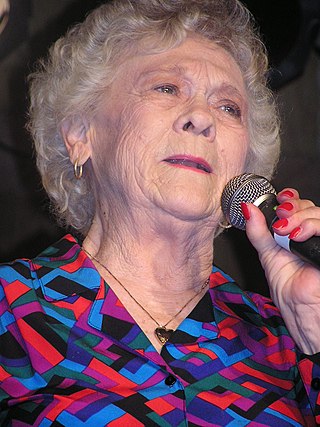
Jean Shepard was an American honky-tonk singer-songwriter who is often acknowledged as a pioneer for women in country music. Shepard released a total of 73 singles to the Hot Country Songs chart, one of which reached the number-one spot. She recorded a total of 24 studio albums between 1956 and 1981, and became a member of the Grand Ole Opry in 1955.
"A Dear John Letter", or "Dear John" is a popular country music song written by Billy Barton, Fuzzy Owen and Lewis Talley. It was popularized by Ferlin Husky and Jean Shepard, and was a crossover country-pop hit in 1953.
Kenneth F. Nelson was an American record producer and A & R man for Capitol Records.

The discography of American country singer Jean Shepard contains 29 studio albums, 12 compilation albums, two live albums, 1 box set album, 72 lead and collaborative singles, four promotional singles, two other charted songs and nine album appearances. Her first singles were released by Capitol Records in 1953, beginning with "Crying Steel Guitar Waltz". Her next two releases featured vocals by Shepard and a recitation by Ferlin Husky. The first was "A Dear John Letter", Shepard's only number one single on the US Hot Country Songs chart. It also reached number four on the US pop chart and number three in Australia. The second was "Forgive Me, John", which reached the US country top five, the US pop top 30 and the Australia top 20. In 1955, her solo singles "A Satisfied Mind" and "Beautiful Lies" both reached number four on the US Hot Country Songs chart. Their B-sides also charted on the US country chart: "Take Possession" and "I Thought of You". The latter peaked in the US country top ten.
"A Satisfied Mind" is a song written by Joe "Red" Hayes and Jack Rhodes. Hayes explained the origin of the song in an interview: "The song came from my mother. Everything in the song are things I heard her say over the years. I put a lot of thought into the song before I came up with the title. One day my father-in-law asked me who I thought the richest man in the world was, and I mentioned some names. He said, 'You're wrong; it is the man with a satisfied mind.'"
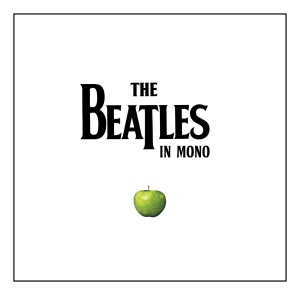
The Beatles in Mono is a boxed set compilation comprising the remastered monaural recordings by the Beatles. The set was released on compact disc on 9 September 2009, the same day the remastered stereo recordings and companion The Beatles were also released, along with The Beatles: Rock Band video game. The remastering project for both mono and stereo versions was led by EMI senior studio engineers Allan Rouse and Guy Massey.
"Gone" is a 1957 single by Ferlin Husky written by Smokey Rogers. The song was Ferlin Husky's second No. 1 on the country chart, where it stayed at the top for ten weeks with a total of 27 weeks on the charts. The vocal backing on the song was provided by the Jordanaires with soprano Millie Kirkham. "Gone" also crossed over to the Hot 100 peaking at No. 4. Selling over one million copies, 'Gone" was awarded a gold disc.

Songs of a Love Affair is the debut studio album by American country artist Jean Shepard. The album was released in May 1956 on Capitol Records and was produced by Ken Nelson. The release has been said to have been one of country music's first concept albums in history and also one of the first to be released by a female country music artist. The album's concept focused on an extramarital love affair between a husband and another lover. The album is told from the point of the view of the wife. The disc was released originally on vinyl, but later released on CD and to digital markets.
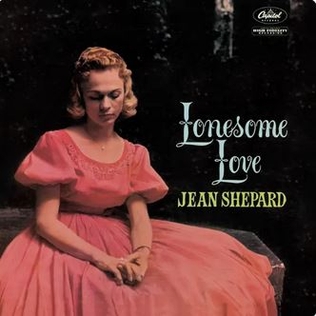
Lonesome Love is a studio album by American country artist Jean Shepard. The album was released in December 1958 by Capitol Records and was produced by Ken Nelson. It was another album released by another central theme, focused mostly on songs about lost love. The album was a collection of 12 tracks, featuring both new material and cover tunes. It was met with positive reviews from music publications following its release.
"Forgive Me, John" is a song written by Fuzzy Owen, Jean Shepard, and Lewis Talley and was recorded by Ferlin Husky and Jean Shepard. It was released in September 1953. The song reached number 4 on the Billboard Most Played C&W in Juke Boxes chart and number 24 on the Billboard Hot 100.
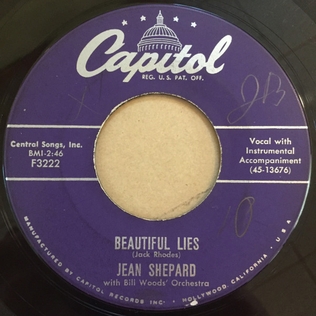
"Beautiful Lies" is a song written by Jack Rhodes and recorded by American country singer Jean Shepard. It was released in September 1955 by Capitol Records as a single. It became Shepard's fifth top ten single on the US country chart in her career and was given positive reception by critics.
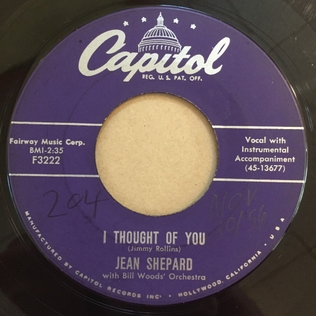
"I Thought of You" is a song composed by Jimmy Rollins that was recorded by American country singer Jean Shepard. Released as a single in 1955, it became a top ten song on the US country chart in 1955, becoming Shepard's fourth top ten recording in her career. It was given positive reviews by publications following its release.
Rarities is the name of two separate and unrelated compilation albums by the English rock band the Beatles. The first was released in the United Kingdom in December 1978, while the second album was issued in the United States in March 1980.

Got You on My Mind is a studio album by American country artist Jean Shepard. It was released in March 1961 by Capitol Records and was a collection of 12 tracks. The album featured all cover tunes with Shepard at times harmonizing with herself on the recordings. It was Shepard's third studio album in her career. It was met with positive reception from critics following its release.

Heartaches and Tears is a studio album by American country singer Jean Shepard. It was released by Capitol Records in March 1962 with a total of 12 tracks. The tracks mixed both new material and cover tunes. Among its new tracks was the single "How Long Does It Hurt ". It was the fourth studio album of her career and fifth overall. The album was met with positive reviews from publications.

Lighthearted and Blue is a studio album by American country singer Jean Shepard. It was released in October 1964 by Capitol Records and was her fifth studio album. It was the first studio project released following the death of Shepard's husband in a plane crash in 1963. The album was a collection of 12 cover songs that was reviewed positively by both Billboard and AllMusic. It was her first album to make the US country chart as well.

It's a Man Every Time is a studio album by American country singer Jean Shepard. It was released in November 1965 by Capitol Records and featured 12 tracks. The album's title track was its only single. It was given a positive reception by Billboard magazine following its release and was her second album to make the US country chart.












